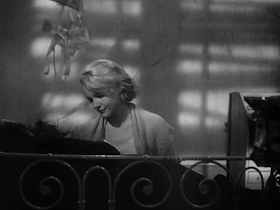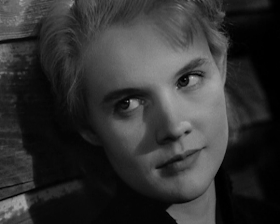The strange tale has a whole past history that we don't get to actually see, but when we jump into everything there is quite a bit of "baggage" in terms of characterization and plot detail. Baby Doll is the nineteen-year-old blonde bombshell who is "stuck" as the wife of Archie Lee -- a fat, old grump of a man who she was given away to by her father before he passed away.
But the complicated twist is what drives the film and the actions of the characters; Baby Doll is to remain a virgin until the day of her 20th birthday, which just so happens to be around the corner. Archie Lee is getting awfully impatient with the deal, and Baby Doll is getting impatient and frustrated with Archie Lee's attempts to get his hands on her, even more so when the day is approaching. Williams' skillfull layout of visual detail has Baby Doll physically shown as infantile by placing her in a large crib to sleep, away from the grown ups, and the responsibilities of a grown up.

Though Baby Doll is a child mentally, she is clearly a woman physically; with gorgeous looks and a subtle but appealing charisma that attracts frequent masculine attention that bugs Archie like nothing else. But Baby Doll is equipped with a sharp edge of wit and sass which she uses as a defense of her lack of moral and social importance in this male dominated world. Baker's dexterity with the words conveys the humor and depth of the character and how she must manuever her way to get what she wants. But what exactly does Baby Doll want, and why does she do what she does? Sure, she can stand up for herself by emasculating her hubby while scoring points for it, and being a ditzy, luscious tease around younger men but the core of the character is still a mystery.

Baby Doll has an interesting history and has a presence of being active in the current action while at the same time somehow slipping under the radar. In the case of Malden's Archie Lee, his inner self is palpable in nearly every scene with his rage spouting out in nearly every scene. But Baker does something a little bit different; she conceals the essential enigma of Baby Doll and her interiority without hardening her characterization of a character we don't quite know too much about.
The arc of the story starts after Archie Lee commits arson by burning down the plantation of a rival cotton gin run by a younger, stronger, better looking man named Sila Vaccaro (Eli Wallach in a sleazy, but human and charismatic performance) who has Archie Lee pegged for the crime. Though instead of going directly at him, he sets his sights on Baby Doll and having a bit of fun and games with her to get some proof and truth out of the situation at hand.
Baby Doll is left for the day to "entertain" Vacarro at Tiger Tail, and to play hostess while the suspecting Archie Lee works from afar,
without his eye on his precious bride. Meanwhile, Baby Doll is perused by Vaccaro as he tries to coax whatever useful information this piece of eye-candy might have in store for him.
What first begins as playful banter slides into some pretty heavy territory; as Baby Doll plays dumb, bobs and weaves through the accusations being not-so-subtly tossed at her every which way. These sequences where the peak of her characterization lies are easily the most essential, and Baker handles them with skillful detail. Between the lines and actions the script offers her, Baker quietly conveys the intelligence and awareness of a character who's, by design, a child (baby) trapped in a woman's body. She's distilled, but never vacant, and without Malden's Archie Lee in the way, Baby Doll has discovered something she had never known before: that she too has the ability to play the kinds of "games" that the other grown ups around her do.

Beside her intellectual "discovery", Baby Doll experiences what is possibly her first sexual awakening during the standout swing scene. Uncomfortable and fidgety, Baby Doll weakly defends her self against Vacarro's intimate advances and tells him that she does not like to be touched in this kind of framiliar and odd way. A way she has never truly known outside of a little flirting on the side with boys. But alas, she slips into the magnetic erotic sensation that alas feels genuine and creates a turning point for the story and the character.

This focused, yet vague scene is set-up by Kazan as a sex scene; but one that is accomplished through words and seduction and ends with a wobbly exit of an "orgasm" as it fades. Her first brush with real sexual intimacy, derived from Silva instigates a kind of fascination within herself and this unusual man who's gotten too close. Baker (as well as Kazan's tight yet free-wheeling direction) makes the scene entirely effective in nearly every way. What the actress does with her eyes, face, and dialogue carves the interiority of the character that we were unsure even existed; something that Williams' text hints at but never express'. In the case with his Blanche DuBois. the character has a full, complicated history and turmoil that is written and acted with clarity. But Baker succeeds in assembling a compelling, richly shaded interior life almost without the help of the script which only hints at one.

All of this leads up to the erotically charged game of hide and seek that they play throughout the crumbling mansion, as an adult might do with a young child.
But after the playful game and a rough scrape, wherein Vacarro physically empowers Baby Doll, forcing her to sign the affidavit to the arson committed, Baby Doll has a strange change of heart as Vacarro decides to take off. For the first time all day she wants him to stay, as she insists that he wanted something else out of this odd day spent with her. It seems to be a moment of clarity from within herself that she fully desires to embrace, which includes keeping the company of Vaccaro.
It's a life-altering moment of transcendence for her in some way that she does not want to let go of, for she now somehow feels a sense of satisfaction and guidance as she enters the complicated but fascinating world of adulthood. Baker draws us in on this internally, and does so with delicate shadings. On my first initial viewing of
Baby Doll, I hadn't really seen much into the character, but going back into it I witnessed the infrastructure Baker crafted into this strange creation called Baby Doll.
Baker provides the film with it's emotional compass, and certainly held my emotional interest well beyond what I was actually seeing and into the layers beneath. Providing such, allows Baby Doll to be the single person in the narrative who grows and changes with a totally credible character arc.
Her internal transformation from docile, immature child-bride to a willful, sharp, and independent young woman of integrity and clarity, free from the constraints of repression is a mighty powerful one. Through Baker's meticulous work, we see that Baby Doll now has the power to access everything from her maturity, morality, sexuality, etc. -- all from herself.

Baker has shown us a complete human being, one possessed of a full, rich interiority that matches her ever-complex (and ever-changing) exterior. (But it's interesting to read that Williams had pressed for Marilyn Monroe to step into the title role (as she had recently "sharpened" her acting abilities), but Kazan just knew that Carroll Baker was right and fit the mold. And thankfully the choice was made. Maybe she wouldn't have been terrible (how can someone be under Kazan's helm?), but I just can't see Monroe finding the nuances of character that Baker did with clarity. Her possible muddying/misreading of the character could have resulted in something not too good.)
Once the shit hits the fan, and a whole mess has gone down with the two men, Silva says he'll be back the next day for Baby Doll and her Aunt Rose...
...leaving Baby Doll to fend for herself in a world she just started living. The sadness, confusion, and longing that comes through in these truths flicker across Baker's face with some of the most genuine (and subtle) kind of emotional depth that I have ever seen in film acting.
Carroll Baker's work maintains awesome spontaneity and natural ease even when it's being meticulous and actorly. Her intuitive understanding of the text results in a complete characterization of a highly fascinating and multi-dimensional creation. From the combined galvanizing force of Tennessee Williams, Elia Kazan and Carroll Baker it is proven that even after the
Streetcar quartet, perfection is still possible.




































